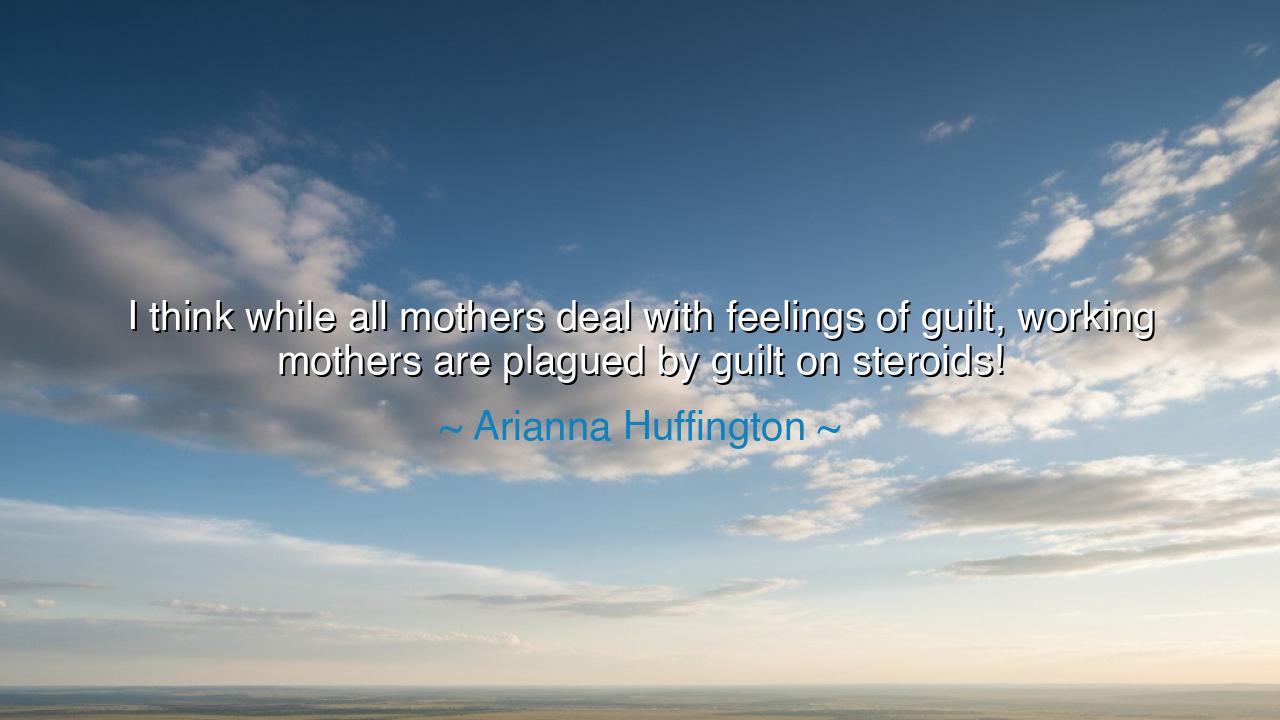
I think while all mothers deal with feelings of guilt, working
I think while all mothers deal with feelings of guilt, working mothers are plagued by guilt on steroids!






Hearken, O children of reflection, to the words of Arianna Huffington, whose insight pierces the veiled struggles of the modern age: “I think while all mothers deal with feelings of guilt, working mothers are plagued by guilt on steroids!” In these words lies a profound truth that speaks to the heart of human endeavor: motherhood is a sacred calling, laden with responsibility, love, and sacrifice. Yet when paired with the demands of labor outside the home, this calling becomes an intricate tapestry of tension, expectation, and ceaseless emotion. The guilt of a mother is not a simple feeling; it is a force that weighs upon the spirit, amplified in those who strive to fulfill dual roles with devotion and care.
The ancients understood the burden of divided duties. In the village, the mother who labored in the fields while tending her children knew the quiet ache of being torn between duties, each demanding her heart, strength, and attention. Huffington’s metaphor of “guilt on steroids” evokes this ancient struggle, intensified in the modern world, where the demands of work, ambition, and societal expectation clash with the unyielding devotion of a mother’s love. The working mother carries the weight of two worlds, each legitimate, each demanding, yet rarely fully reconcilable.
Consider the life of Madame Curie, who, in the dawn of the 20th century, balanced her groundbreaking scientific work with the care of her daughters. She loved her children fiercely, yet the pressures of her laboratory, her tireless pursuit of knowledge, and the expectations of society imposed a burden of guilt upon her soul. Each experiment, each lecture, each hour away from home became a test of heart and spirit, a reflection of the struggle Arianna Huffington so vividly describes. The duality of labor and motherhood, ambition and love, creates a tension that echoes across generations, reminding us that greatness often comes entwined with sacrifice.
Yet there is also nobility in this struggle. The guilt of the working mother, though heavy, signifies devotion, conscience, and the unbroken desire to give fully of herself. It is a recognition that the tasks she undertakes—both in the home and in the world beyond—bear consequence, and that her love and attention are finite but precious. Huffington’s words do not merely describe a challenge; they honor the courage required to navigate it. To endure this amplified guilt is to demonstrate both fortitude and the depth of maternal devotion.
History is rich with examples of such resilience. Women like Sojourner Truth, who labored ceaselessly for justice while caring for children in a world of oppression, embody the truth of Huffington’s insight. They carried the burden of societal expectation and personal conscience, navigating roles that demanded every ounce of heart and strength. The working mother, then, becomes a symbol not only of labor but of heroic persistence, managing the delicate balance between duty and love, and bearing a guilt that is the shadow of profound care.
The lesson flows clear and enduring: guilt is a reflection of love, not a measure of failure. Mothers must recognize the weight of their dual roles, honor their devotion, and practice self-compassion. To endure “guilt on steroids” is not a failing but a testament to the breadth of the human heart, to the unyielding capacity for care, and to the courage required to pursue both vocation and family. Understanding this distinction allows the heart to heal and the spirit to flourish.
Practical guidance arises from this insight: working mothers must cultivate self-awareness, delegate where possible, and allow themselves grace. Communicate openly with children and partners, celebrate moments of presence, and acknowledge that perfection is neither attainable nor necessary. Embrace the dual paths with courage, knowing that each step taken in love, whether at home or in the world, carries value beyond measure.
And so, let the teaching echo: honor the working mother, recognize her burdens, and embrace her courage. Let guilt be understood as a sign of devotion, not deficiency, and let wisdom guide actions, balancing work and love with compassion and intention. In doing so, the spirit is freed from undue judgment, and the mother, though tested by the amplified weight of responsibility, becomes both resilient and radiant, a living testament to the enduring power of love, labor, and heart.
If you wish, I can also craft a lyrical, audio-ready version with rhythmic cadence, rising and falling phrasing, and pauses designed to deeply engage listeners. Do you want me to do that next?






AAdministratorAdministrator
Welcome, honored guests. Please leave a comment, we will respond soon